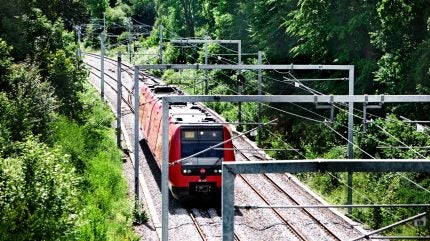
Denmark’s largest rail operator DSB has signed an agreement with European Energy to support the construction of a solar park in Eastern Denmark that will help power its light rail network, known as the S-Train/S-Tog, in Copenhagen.
The 253-hectare Rødby Harbour solar park in Lolland Municipality will begin construction later this year and is expected to have an annual production of 262 GWh, 80GWh of which have been purchased by DSB.
Aske Wieth-Knudsen, DSB’s head of sustainability, said: “We actively want to accelerate the green transition in Denmark, as we aim to reduce the climate impact of our operations by 98 percent by 2030 compared to 2019.
“With this agreement, we contribute to a faster transition to green electricity in Denmark, thereby strengthening the position of trains as one of the most climate-friendly modes of travel.”
The park is set to be one of the largest solar fields in Denmark once it opens in 2025, and the power generated will be used by DSB to cover 50% of the current electricity consumption of the S-Tog network in the Danish capital.
Jens-Peter Zink, deputy CEO at European Energy, highlighted the lack of renewable electricity sources in Eastern Denmark and said: “As more parts of society become electrified, we will need more green energy capacity.
How well do you really know your competitors?
Access the most comprehensive Company Profiles on the market, powered by GlobalData. Save hours of research. Gain competitive edge.

Thank you!
Your download email will arrive shortly
Not ready to buy yet? Download a free sample
We are confident about the unique quality of our Company Profiles. However, we want you to make the most beneficial decision for your business, so we offer a free sample that you can download by submitting the below form
By GlobalData“Therefore, it is incredibly important that large entities like DSB engage in the green transition and help bring renewable energy projects like this to life.”
DSB’s investment continues the company’s interest in renewable energy and sustainable solutions for the growth of its rail networks as it seeks to achieve net zero emissions by 2050.
Alongside reducing its scope 1 and 2 emissions by 98%, the company’s interim targets for 2030 also include halving its energy consumption, eliminating particle emissions from its train engines, and recycling 90% of its waste.
Additionally, DSB has been investing in new train fleets with a 10-year programme to replace its ageing fleet with more efficient and sustainable alternatives, including a $2.8bn order for 100 Coradia Stream trains from Alstom.


